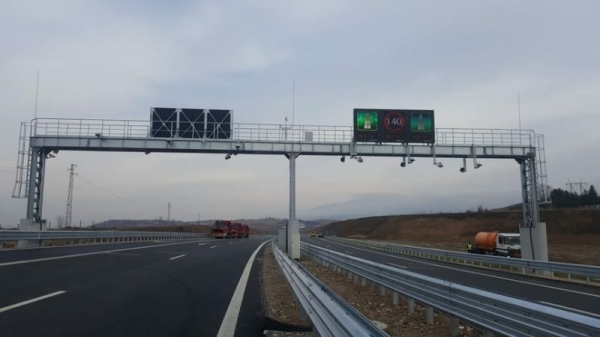Sofia-Thessaloniki highway to become route for autonomous vehicles

Bulgaria and Greece are laying the foundations for the development of autonomous mobility in the region thanks to a part-EU-supported project which will see 5G communication equipment installed along the Sofia-Thessaloniki road by 2025, to facilitate the use of autonomous vehicles.
The project will enable the tracking of trucks, while the development of the network will make it possible to test in real conditions autonomous vehicles that move along a set route without a driver.
Half of the €11 million investment for the Sofia-Thessaloniki 5G corridor is provided by the European Commission, and the rest via private investment from a Bulgarian and a Greek mobile operator, Deputy Minister of Transport and Information Technologies Zlatina Nikolova told EURACTIV in an interview.
Back in 2018, Bulgaria, Greece and Serbia signed a joint agreement to develop experimental cross-border 5G corridors that allow the testing of autonomous cars. The idea was to make the network so driverless cars could even pass through border control.
In 2022, the project started, but without the participation of Serbia. “The goal of the project is to first connect Sofia with the Greek port city of Thessaloniki with the prospect of developing autonomous mobility along the main transport corridors of the Balkans,” Nikolova explained.
Bulgaria’s external EU border with Turkey is the busiest in the bloc, followed by Kulata-Promahon on the border with Greece. Bulgaria is not yet a member of Schengen, and this border crossing point remains a bottleneck for road transport.
“There were not many European projects that offered similar opportunities. With the active support of the government, a Bulgarian and a Greek operator started working together on this project and received a very high evaluation from the European Commission. The contract was signed last year, and we hope this will continue with the transport corridors to other neighbouring countries”, Nikolova said.
The route from Sofia to Thessaloniki will become operational when the Bulgarian and Greek operators connect their networks, allowing cargo tracking to continue even after the truck crosses the border.
All data recorded from the trucks by the Bulgarian operator will be automatically transferred to Greece via a 5g mobile network, as mobile phones do.
“This was one of the first EC-funded projects of this kind. The Commission finances a total of three such projects in Europe. The idea is that the development of autonomous mobility will reduce accidents, the carbon footprint and increase the security of supplies,” says Nikolova, adding that Bulgaria is one of the countries actively laying the foundations of autonomous mobility.
“We should not forget that Bulgaria is a border country, and a large part of the freight traffic to the EU passes through our territory,” she says.
The Bulgarian government already has ideas for developing similar digital corridors along the main roads to Romania and Turkey, for which there is also interest in investment from mobile operators.
According to government data, Bulgaria started developing its 5G network in 2020 and already has coverage for over 50% of its population. This means 300 cities and towns in the country have access to 5G coverage while the government’s focus is shifting to using the technology along transport corridors.
Across the European Union, a legal framework for fully automated vehicles with autonomous driving functions was finalised in July 2022 through an adaption of the existing type-approval regulation, which was expanded to include fully automated vehicles.
Read more with EURACTIV




